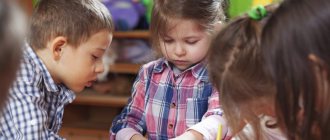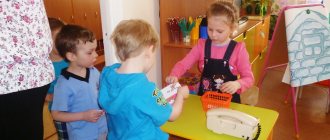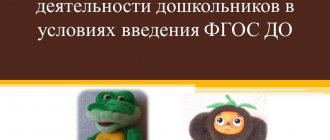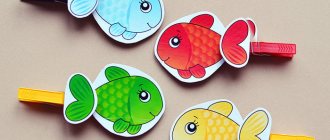MAGAZINE Preschooler.RF
Social and communicative development of preschool children through project activities“A child by nature is an inquisitive explorer, a discoverer of the world
So let a wonderful world open before him in living colors, bright and vibrant sounds, in a fairy tale, in a game, in his own creativity, in beauty. Through a fairy tale, a game, through unique children’s creativity - the right path to a child’s heart.”
V.A. Sukhomlinsky.
In modern conditions of social development, changes in the socio-economic sphere, culture and education, the issues of education, training and development of the younger generation are of particular importance. Today, preschool education in Russia is rightfully recognized as the initial link in the system of continuous general education.
In the Federal State Educational Standard for Preschool Education, much attention is paid to preserving the uniqueness and intrinsic value of childhood as an important stage in the overall development of a person; The emphasis is placed on the development of the child’s personality, socialization, and the disclosure of his potential capabilities and abilities.
In this regard, the main range of tasks of modern preschool educational organizations is shifting to creating conditions under which children fully develop, mastering the stage of preschool childhood, and move to the next level motivated to receive education at school. One of the priority areas of education for children of senior preschool age, which reflects the social order of society and the family, according to the Federal State Educational Standard for Education, is their social and communicative development.
Many preschoolers experience serious difficulties in communicating with others, especially with peers. Some children do not know how to address another person on their own initiative; sometimes they are even embarrassed to respond appropriately if someone addresses them. They cannot maintain and develop established contact, adequately express their sympathy and empathy, and therefore often conflict or become isolated.
A child’s mastery of culture and universal human experience is impossible without interaction and communication with other people. And a child’s ability to communicate positively allows him to live comfortably among people. Thanks to communication, he not only gets to know another person, be it an adult or a peer, but also gets to know himself more and more.
The relevance of the social and communicative development of preschool children is increasing in modern conditions due to the characteristics of the child’s social environment, in which there is often a lack of good manners, kindness, goodwill, and speech culture in relationships between people. Teachers of preschool educational organizations are concerned about changes in the moral, social and communicative development of children, and their behavior. The problem of introducing a child to the social world, developing his ability to adequately navigate an accessible social environment, realize the intrinsic value of his own personality and other people, express feelings and attitudes towards the world in accordance with the cultural traditions of society at the present stage of social development remains one of the leading ones.
What is social and communicative development? This is a complex process during which a child learns the values, traditions, culture of the society or community in which he will live.
Social and communicative development is implemented in several directions:
- Development of gaming activities
- Patriotic education
- Formation of the foundations of safe behavior in everyday life, society, and nature.
- Labor education
We would like to share our experience in integrating pedagogical initiatives to implement a program of socio-communicative development and social education of preschool children through patriotic development.
The problem of patriotic education of the younger generation is one of the most pressing today. Patriotic education of preschoolers is not only about instilling love for one’s home, kindergarten, city, native nature, the cultural heritage of one’s people, one’s nation, and a tolerant attitude towards representatives of other nationalities. But also fostering a respectful attitude towards the worker and the results of his work, his native land, defenders of the Fatherland, state symbols, state traditions and national holidays.
It is very important that children understand as early as possible that the big Motherland is Russia, the Russian Federation, it is one for everyone who was born in its vastness, who loved it, who makes efforts to make it even more beautiful, richer, and become a powerful power. And each of us needs to be able to be useful to her. And for this you need to know and be able to do a lot; From childhood, do things that would be for the benefit of your home, kindergarten, city, and in the future - for the benefit of the whole country. If a person cares about the Motherland, it means that he is its son, and that means Russia is the Motherland for him.
The child cannot organize such activities independently. An adult should help him using new modern technologies. This technology is design technology, which is based on participation in activity. The use of design technology makes it possible to develop search behavior that is relevant for a person and allows the teacher to make the first contribution to the culture of the individual: cooperation, creation, dialogue, friendship, tolerance - components of the “culture of peace” . The project method will allow you to take into account one of the main principles - the principle of integration: combining several types of activities.
In the course of joint work with children on a project, adults help introduce the child to culture: children master positive patterns of behavior in nature and society; acquire a positive and responsible attitude towards themselves, others, and nature; children receive the right to self-development.
Therefore, one of the main means of patriotic education in preschool educational institutions is the project method. Based on a personality-oriented approach to teaching and raising children of senior preschool age, he develops cognitive interest in various areas of knowledge, develops cooperation skills; opens up great opportunities in organizing joint search activities of preschoolers, teachers, and parents.
The teachers of our preschool institution developed a long-term project “Little Patriots” . The project is designed for children of senior preschool age.
Objective of the project:
- Formation of patriotic qualities of a child’s personality through introducing children to family traditions and values.
- Raising a citizen and patriot of his country, who loves his family, home, and people close to him.
- Developing the ability to work in a team and collaborate.
We worked on the project for 6 months. The project includes 4 thematic blocks.
- block – “My family”
- block – “Green Street”
- block - “I love you, city of Yekaterinburg” .
- block – “Victory Day”
Let's take a closer look.
Block 1 - “My Family”
The love of a small preschool child for the Motherland begins with the relationship with the closest people - father, mother, grandfather, grandmother. For a child, a family is a world in which the foundations of morality and attitude towards people are laid. Family members are united by blood, love, common interests, traditions, and holidays. It is in the family that such concepts as “compassion” , “mercy” , “kindness” , “masculinity” , “femininity” , “cohesion” , “unity” , “helping others” , “respect for elders” , “feeling responsibility .
To interest children in studying this topic, we held fascinating conversations and trainings on the topics: “My friendly family” , “Tell me about your family” , “ My household responsibilities” , “If mom is tired” , etc.
The children were very interested in the topic; everyone wanted to tell as much as possible about their family, and for this they, together with their parents, created video presentations and organized a photo exhibition “Our Family Vacation” .
Parents responded to all the proposed tasks related to project activities, took up the work with interest, everyone contributed interesting ideas,
Almost no family was left behind.
The children with great love made various crafts with their own hands, both from paper and from available materials: “Gift for Mom” , “Rug for the House” ; willingly sculpted, constructed from building materials and Legos, and actively took part in the “A Home for My Family” .
The final event for working on the theme “My Family” was the holiday “Inseparable Friends are My Whole Family .
Block 2 – “Green Street”
The feeling of love for one’s native nature is another component of patriotism. It is by nurturing a love for nature that one can develop the patriotic feeling of preschoolers: after all, natural phenomena and objects surrounding the child are closer to him and easier for him to perceive, and have a stronger impact on the emotional sphere. Trying to instill in children a love for all living things, we, together with our parents, carried out various forms of work, such as: the campaign “Clean up the Planet” , “A Cozy Home for the Starling” , “Animal Food” , Operation “Sprout” , within the framework of which, We were planting trees, shrubs, and flowers. We organized a “Nature Corner” We held competitions, “Best Flowerbed” , “Miracles in the Garden” , and a photo competition “Portraits of Wildlife” .
The result of the work on the “Green Street” was a generalization of our knowledge and participation in the “Ecological Path” .
Our work allowed us to expand children's knowledge about the nature of their native land, taught children to work in a team and respect each other. The children received answers to their questions and made recommendations for the residents of our city “How to preserve and decorate our planet”
Block 3 - “I love you, city of Yekaterinburg” .
Each person has his own small homeland. Most often, the favorite city is the place where a person was born and raised. To form the foundations of civic culture and social and moral development in children, it is necessary for children to acquire knowledge about their hometown.
Without sufficient knowledge, it is difficult to form in a child a respectful attitude towards the Motherland. Childhood memories are the most vivid and exciting. The more a child knows from childhood about his native places, his hometown, the closer and dearer his homeland, Russia, will become to him.
As part of this topic, together with the music director, we held conversations with children on the topic “I was born here!” , “We are proud of you, our native city ,” formed the children’s knowledge about the sights of the city, memorable places, we were able to visit some of these places. We designed a photo collage on the theme “I love you, city of Yekaterinburg .
Together with the physical education teacher, the children took part in the quest game “On the City Streets” .
A survey was conducted for parents : “Do you know your city?” , developed reminders “Famous people about love for the Motherland” , “A citizen is raised from childhood” .
We created an excursion and tourist route “Our City for Children”
The result of the work in this section was a generalization of our knowledge and participation in the musical festival “City of Miracles” .
Block 4 - “Victory Day”
Every year, fewer and fewer veterans of the Great Patriotic War remain alive. We, the current generation, are obliged to remember those who forged Victory at the fronts and worked in the rear. It is the direct responsibility of adults to help preserve the memory of the heroic facts of our history, to instill in young citizens pride in their Motherland, and to nourish the receptive soul of a child with sublime human values.
We adults have the task of expanding the social competence of children in matters of social significance of the national holiday of Victory Day within the boundaries accessible to children, emphasizing the importance of introducing preschoolers to the fact that war is always a tragedy and grief for people. At the same time, it is important for children to learn to admire the courage and heroism of the people who defended their Homeland; experience your involvement with distant events of history, feel the joy of the Great Victory, pride in your Fatherland.
This topic is loved by children. Heroism, courage, readiness to perform feats in the name of the Motherland - these traits of a Russian warrior are understandable to older preschoolers; they evoke respect and a desire to be just as courageous and brave. The project includes a number of activities aimed at the search and research activities of preschool children and the development of communication skills and abilities. We visited the “Museum of Military Equipment” in the city of Verkhnyaya Pyshma and laid flowers at the Great Patriotic War Memorial. Children and their parents are happy to take part in the “Immortal Regiment” , and I am proud to talk about veterans.
Having teamed up with other groups, in our kindergarten we organized an exhibition “Thank you for the victory,” which included photographs of the war years, military uniforms, photo albums of brothers, fathers, grandfathers, great-grandfathers who served in the armed forces of the Soviet and Russian armies, children “Victory Day” postcards .
We listen with interest to songs on military themes, they are easy to remember, their content is in tune with the desires of the children to be strong and brave defenders of our Motherland. Children and parents took an active part in the patriotic song competition “The song saved us in the trenches .
The result of the work on this section is the publication of the newspaper “We brought this day closer as best we could...” and the musical festival “Happy Victory Day!”
To summarize, I would like to note that the main task of a modern preschool educational organization is to ensure that pupils emerge from its walls not only with a certain stock of knowledge, abilities and skills, but also with a certain set of moral qualities necessary for later life, mastering social, ethical standards of behavior. It is important to develop in preschoolers the ability to build relationships with others on the basis of cooperation and mutual understanding, to ensure general mental development, to form the prerequisites for educational activities and the qualities necessary for social adaptation, including school learning.
As a result of using project activities, children became more liberated and independent, purposeful and self-confident, sociable, more attentive and caring towards peers and adults; capable of mutual understanding and cooperation.
| Next > |
Social pedagogical project on the theme “Do good”
Project passport
The type of project is creative.
The content is socio-pedagogical.
By the number of contacts - joint activities of teachers, speech therapists, psychologists, music directors, physical education instructors, older students - preparatory groups and their parents.
In terms of time – short-term.
Project participants: pupils of MBDOU “Kindergarten No. 44 “Andreika” aged 5 to 7 years, teachers, speech therapists, physical education instructor, music directors, parents.
Project motto: Kindness will save the world!
Relevance:
What is good? This is a very easy, but at the same time difficult concept, especially for a preschooler to perceive.
Kindness is an inner feeling of a person. People who do good deeds are magic to us all. There are people who are ready to do good deeds day and night, and these are not only mothers. Of course, the mother is considered the guardian of the family. And, of course, it is the mother who plays an important role in the life of every person. The formation of relationships between a preschool child and mother is of great importance for the development of the child’s personality. Unfortunately, sometimes children associate love for their mother only with material values, and not spiritual ones.
But can only a mother do good? You and I know that there are a lot of people who do good.
To celebrate Mother's Day, we decided to combine two themes. Kindness from the mother and family, and people who bring goodness to society free of charge throughout their lives - these are volunteers.
Our project is aimed at forming friendly relationships between people, respect for one’s neighbor, and providing all possible assistance.
After all, children are our flowers, but these flowers often do not notice how they offended each other, their relatives, created some kind of conflict situation and cannot resolve it.
We will try to teach students to evaluate their actions and the actions of others.
Our project is a wonderful opportunity to reflect on goodness. Which ultimately should form an idea of universal human values and contribute to the spiritual and moral development of children.
Goal: Formation of a culture of social assistance as the most important factor in the spiritual and moral development of a child’s personality.
Tasks:
— To develop in students a positive attitude towards all people.
— Deepen children's understanding of kindness as a valuable, integral quality of a person.
— To cultivate kindness, responsiveness, friendliness, the desire to do something for other people, to benefit them.
Tasks for working with parents:
— To interest parents in the upbringing and formation of the moral culture of children. — Increase the competence of parents on the topic of the project week. — Involve families to participate in the educational process on the basis of pedagogical cooperation. — Consultations for parents on the topic of the week.
Stages of work on the project:
I. Search stage
- Determining the topic of the project, setting goals and objectives.
- Studying literature on project activities.
- Preparation of methodological literature.
II. Analytical stage
Material and technical resources necessary to complete the project: - selection of methodological and fiction literature; — selection of visual material (illustrations, posters, photographs, books, fairy tales); — didactic games; - selection of cartoons; presentations on the topic; — an exhibition of books, drawings, an exhibition of creative works of parents and children.
Necessary conditions for the implementation of the project: - interest of parents and children; — methodological developments.
III. Practical stage.
Comprehensive thematic planning on the project topic. Direct implementation in the joint activities of the teacher and the child in various educational areas to achieve the assigned tasks.
| No. | Events |
| 1 | Organized educational activities - Cognition (FCCM) - “In the world of kindness” |
| 2 | Organized educational activities artistic and aesthetic development (Drawing) - “Kindness in our hearts” |
| 3 | Organized educational activities of artistic and aesthetic development (Aesthetic education) - “Good deeds” |
| 4 | Organized educational activities of artistic and aesthetic development (Modeling) - “Bouquet as a gift” |
| 5 | Organized educational activities - Speech development (Speech development) - Composing a story based on the plot picture “True Friend” |
| 6 | Cognition (Manual labor) - “Giving joy to mother” |
| 7 | Organized educational activities artistic and aesthetic development (Drawing) - “Portrait of Mom” |
| Project activities | |
| 1 | Campaign “Give a Smile” |
| 2 | A dramatization of the fairy tale “The Stupid Mouse” by S.Ya. Marshak |
| 3 | Photo gallery “Our good deeds” |
| 4 | Workshop of good deeds “Bird feeders” |
| 5 | Thematic exhibition of drawings “Do Good” |
| 6 | Group video “Kindness in our hearts” |
| 7 | Watching the cartoon “Just Like That” |
| 8 | Creation of a book “Kind Helpers”, with statements from children about kindness |
| Final events | |
| 1 | Entertainment for children “The Kindness of Our Hearts” |
| 2 | Concert dedicated to Mother's Day |
Communication development:
Word games
“Kind word”; "Say it kindly."
Role-playing games “Family Holiday”; "Mom's Helpers"
Outdoor games
Dramatization of movements to the music “Rainbow”, “Children drew”, “Freeze”.
Didactic games
“Professions”, “Good Deeds”, “School of Etiquette”.
Listening to songs
“Strong friendship”, “It’s fun to walk together”, “MOM is the first word”.
Reading
A collection of poems and stories about mother “My beloved mother.” S.V. Mikhalkov “Bird’s Canteen” V.A. Oseev “The Magic Word”. L.N. Tolstoy “Bone” N.N. Nosov “Patch”. V.V. Bianki "Sinichkin calendar". "Friendship" (Pakistani Folk Tales). A fairy tale about goodness “Ezhinka’s Journey” (author’s). Russian folk tales.
Project effectiveness:
As a result of the implementation of our project, children have developed social, communicative, creative and organizational skills, and developed experience in moral, ethical behavior and communication.
As a result of cooperation, the children's and adult teams are united through different areas of activity.
While working on the project, we encouraged children's desire to do good deeds and good deeds, the desire to do something for others, to benefit them. They taught us to avoid quarrels and cope with negative emotions, to give in and negotiate with each other, because good deeds bring joy!
Nurturing kindness is a valuable, integral human quality. During the project, we used a variety of didactic games, read fairy tales, studied the rules of kind and polite actions, all this develops children's communication skills: the ability to listen to a friend, and show kindness.
We believe that the activities carried out under the project should continue after its completion. Many people care about us, they give us generously, but they also expect from us, and we have enough strength to do good to people. We can live with dignity in our difficult world only by learning to stick together, support, appreciate and respect each other.
Kindness comes and a miracle happens,
all the wonders of the earth come from human kindness!






